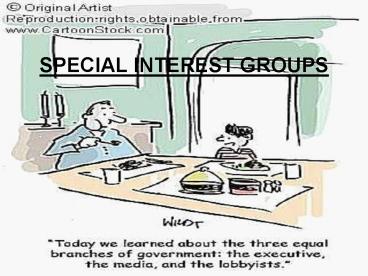SPECIAL INTEREST GROUPS
1 / 14
Title:
SPECIAL INTEREST GROUPS
Description:
How do we know they didn t use their position in government to get cushy private jobs? ... revised in 1995 Gave a definition to people considered lobbyists. – PowerPoint PPT presentation
Number of Views:6
Avg rating:3.0/5.0
Title: SPECIAL INTEREST GROUPS
1
SPECIAL INTEREST GROUPS
2
Explaining Proliferation
- Proliferation the growing or increase.
- Special Interest groups (factions)- an
organization of people sharing a common interest. - Why are they common?
- We are diverse in every aspect.
- The federal system of government makes change at
various levels possible. - Weak political parties.
3
Why Interest Groups?
- Many added after the 1960s and 70s.
- Our economy changed, as it expands and changes
new needs arise. - Government policies (like war) can produce
interest groups. - Leadership (Evelyns Nader).
- The more the government sticks its nose into the
public and private lives of citizens, the more
people want to protect their interests.
4
Institutional Interests
- Groups with large amounts of money that pay for
lawyers or groups to lobby for their interests. - Usually large businesses, but can also be higher
education, or local governments. - Washington has over 38,000 blood sucking lawyers!
5
Membership Interest Groups
- In comparison to other nations, Americans have a
stronger sense of civic duty, or a stronger sense
of protecting their own interests. Usual this
takes place during or as a response to a social
movement. - NAACP
- AARP (old people)
- Environmental
- Sierra Club
- Feminists
- NOW National Organization for Women or
- ERA Equal Rights Amendment
- Unions
- CTA (me)
6
(No Transcript)
7
Why Join an Interest Group?
- Solidary Incentives looking good and hanging
out with your peeps. - Material Incentives
- Newsletters
- Insurance
- discounts
- Purposive Incentives
- (ideological interests groups)
- Public-interests
- Nader!
Thats me.
8
Getting the Dough!
- Foundation Grants
- Most interest groups get over 50 of their funds
from foundation grants. - Federal Grants and Contracts
- The government gives a grant not to the interest
group, but to a project that they are involved
in. - Social Services and community projects.
- Direct Mail
- Using the mail, internet, or phone to get people
to join and pay dues, or to send money to help
the organization - Save the animals gets me every time.
9
What Do These People Do All Day Long?
- Gathering and supplying information
- They need to be up to date on all the latest
research and developments. - Ratings
- How other representatives have voted in the past
will determine how he or she will likely vote
again. - Political Cues
- Will it support the agenda of a representative?
- Is it too liberal or too conservative?
- Will others vote for it?
- What moral or ethical implications will this
have?
10
The Outsider Strategy
- Gone are the days when you golf with your
congressional buddy and give him a cigar in
exchange for a vote. - Now you have to
- Use public pressure to make him/her sweat.
- Use technology to gain immediate support on an
issue. - This works best on high profile stuff.
- Grassroots lobbying
11
The Insider Strategy
- Work closely with a few legislators that trust
you. - Stay away from people who think you are a lying
crazy person. - Spend most of your time with the undecided
people. - Use polls, and grassroots lobbying to gain their
support through the overwhelming, probably
incredibly biased, evidence you are giving them.
12
Does Money Make A Difference?
- Maybe.
- Most PACs give only hundreds to each candidate.
- Because it isnt that much, it really doesnt
dictate policy. - How much you spend may not be as important as
your catchy slogans and strategy. - You wouldnt have catchy slogans and a strategy
without money.
13
Sneaky, Self-Serving People
- Because government pay is horrible, many people
leave to go to the private sector so they can
make millions. - How do we know they didnt use their position in
government to get cushy private jobs? - This is illegal, but happens all the time.
- 1978 Ethics in Government Act (see page 285)
14
Regulating Interest Groups
- Protected under the Freedom of Speech.
- 1946 Federal Regulation of Lobbying Act, revised
in 1995 - Gave a definition to people considered lobbyists.
- Two a year, all registered lobbyists must report
- The names of their clients
- Their income and expenditures.
- The issues that they worked with.
- Only requires federal lobbyists to adhere to the
above. - Campaign Finance Laws
- Limits contributions to political candidates to
5,000. - Religious groups have been limited by the IRS to
keep their tax exemption.































